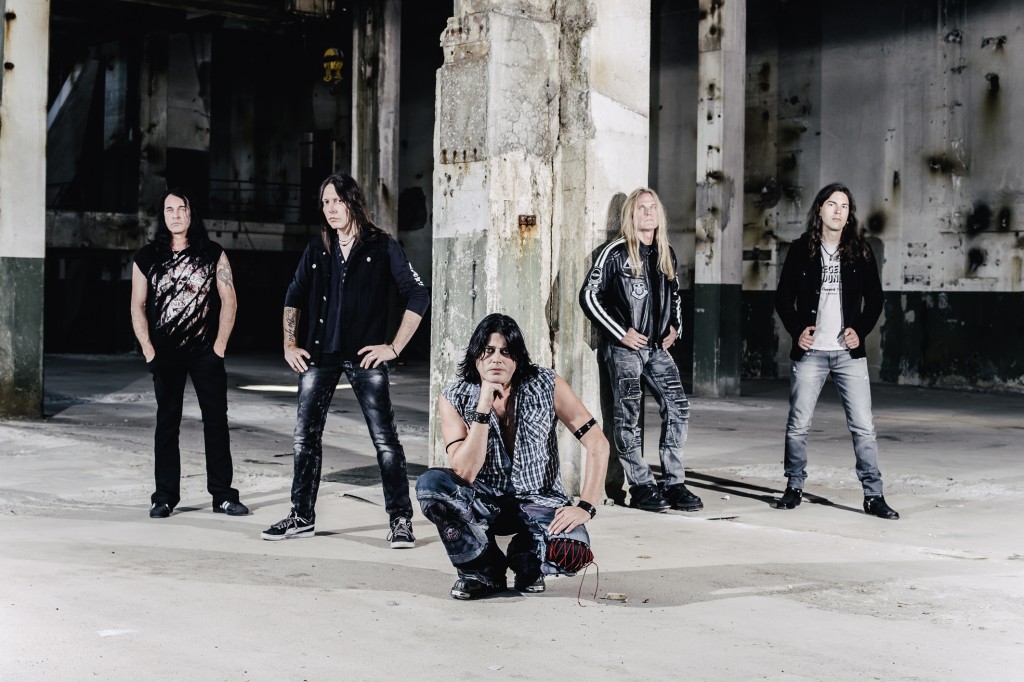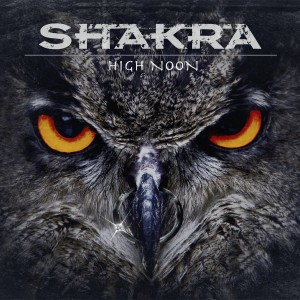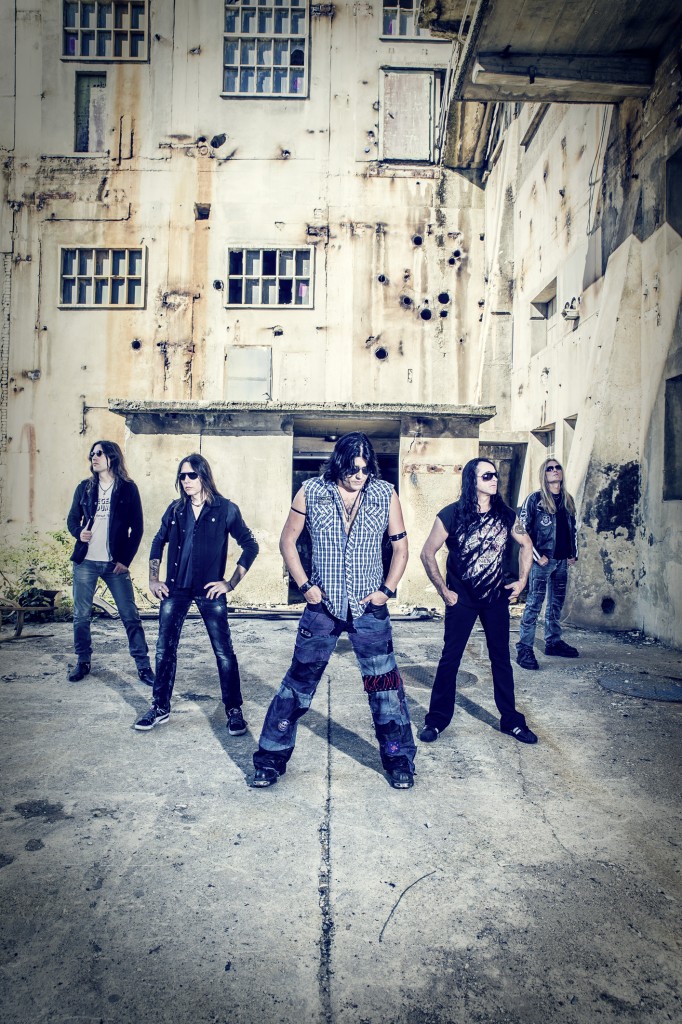
In what can be described as the Swiss version of Eddie Van Halen getting back together with David Lee Roth, vocalist Mark Fox has mended fences with veteran guitar whiz Thomas Muster and has reclaimed his rightful position as the frontman for the influential hard rock band Shakra. And the result is a hard-hitting, pulse-pounding new album called High Noon, which will be released in North America on Feb. 5 through Germany-based AFM Records.
Fox’s addition to the band shortly after the turn of the millennium helped launch Shakra into superstardom in their home country, and they became a bona fide sensation throughout Europe on the back of the hit 2003 album Rising, Fox’s first as frontman.
As often happens, personality clashes, egos, road fatigue and poor communication led to an unpleasant splintering of the otherwise brilliantly creative and prolific partnership between Fox and Muster, leading to the former’s departure in 2009. He was replaced by another young vocalist, John Prakesh, who sang on Shakra albums released in 2011 (Back on Track) and Powerplay (2013.)
When Prakesh announced he was leaving the fold in the spring of 2014, the band’s former producer – legendary Krokus founder/guitarist Chris von Rohr-hosted a summit meeting between Fox and Muster. By that time the hard feelings had abated, the air was cleared and a refreshed and revitalized musical partnership and personal friendship had been rescued.
High Noon is the energetic, high-powered and eminently entertaining result.

“I am happy that the fans seem to be happy to see me back. It was not something they thought was obvious: it was unexpected for them so they must have been surprised when they heard I was coming back because there really were troubles in the band when I left. And when I did go, I made a lot of protests and said a lot of things in newsletters and magazines, which was not easy on the fans at the time either,” Fox said his home in Switzerland, just after a practice, as Shakra prepares for their tour, which starts in March.
“And the way Thomas and I worked has changed since the earlier days. We worked more together on this album. On most of the songs Thomas wrote it at home and made a demo and then he comes to my home and then we work on the melodies together. If it ends up being a good song then we go to the rehearsal room and work on it with the other guys.”
Although his English is halting at times in conversation, Fox writes all of Shakra’s lyrics in English, which can be painstaking at times. It’s doubly so for Fox because he also likes his songs to be a little enigmatic, clever and mysterious.
“The first thing I want to do in a song is paint a picture of the atmosphere that the song has. Like, I don’t want to have a fast, hard-rocking song that is about love and romance. And the second thing is I want to use words that make sense, words that sound right and sound good for the song. I want to have some real emotion there and I want to make some real statements in my words. But they are not often very direct: sometimes the real meaning is hidden. Like the title track from High Noon can mean different things to different people,” he explained.
“I want the listener to make their own mind up as to what a song is about. A lot of the interviewers and fans here in Switzerland are saying the song is about this or that and they ask me what I mean. And I just say, well what do you think it means when you listen to it? And there is no wrong answer. I worry that if I actually say what the song totally means it’s over and the magic is gone.”
Muster started Shakra in 1996 and the band’s first, self-titled album was released a year later. Moving Force came out in 1999 and saw the band land a supporting slot on an extensive tour opening for Great White and Uriah Heep. After the 2001 release Power Ride, original vocalist Pete Wiedmer had to step aside for health reasons. The veteran band then brought in the upstart young Fox, who was just in his early 20s when he became Shakra’s frontman.
Fox now admits that it was his youthful stubbornness and insolence that played a significant contributing factor when he broke away from Shakra six years after joining – the bands most successful years, it must be stated.
“They are all older than me: Thomas is about 15 years older than me. And I am someone who is always full of motivation and energy. I am always pushing to do more and I am always working and wanting to work. It was like this young guy comes into Shakra and really thinks he knows everything. I think I felt like they were just treating me as the singer, just the voice of the band. But I felt I was not just the voice, I wanted to play a real part, a bigger part in the band,” he said.
“It’s like I was the little brother, because it’s like being brothers when you are in a band. And when brothers are together for so long, especially when we are on tour and all together all the time, you get to the point where you don’t want to see the other guys any more. For Thomas and me, we only wanted to see each other on the stage and that was it. But it’s hard when you all have to get together back on that cramped little tour bus.”
The split was admittedly acrimonious, and Fox said he didn’t speak to Muster or any other member of Shakra – long term members Thom Blunier, Dominik Pfister or Roger Tanner – for six years.
Cue Swiss rock legend von Rohr.
Von Rohr is arguably the godfather of the Swiss hard rock and metal scene. He co-founded Krokus in the mid-1970s, and the band went on to become a huge international hit in the 1980s on the backs of albums like Metal Rendezvous, The Blitz, and Headhunter. Krokus also had an affinity for Canadian rock music and recorded kick-ass cover versions of the Guess Who classic American Woman, and Bachman Turner Overdrive’s Stayed Awake All Night.
Now also a respected producer, author and radio/TV host, von Rohr was a mentor to Shakra and formed a close friendship with Fox, which they maintained even after he left the band.
“Thomas knew that we were still friends and he wanted me back in the band. And that is crazy because it was with him that I had the biggest problems. But he decided to contact Chris so that he could get in touch with me and check out what the temperature was. I never could imagine a situation where I would be back in Shakra again so when Chris approached me I said I had to think about it for a bit. I said I needed two or three days. But, honestly, I only took a couple of hours. I called Chris back and said if we can manage the problems we had, it would be a good opportunity,” he said.
“Three days later we met with Chris present because we didn’t know what was going to happen when we were in the same room. But we talked about what happened and it was all very positive. There were no accusations or name calling – nothing like that. We found out that most of the things we needed to say we already did back when we broke up. We both realized we were stubborn and always wanted to be right at the time. But we found we could now discuss things. And now we work so well together.
“In fact we share a lot more of the responsibility for the management of the band now. We do it all ourselves so we’re really co-operating now. I realize that Thomas can do somethings better and I can do other things better. It’s like we’re on the same wavelength now too. It’s more of a partnership now.”
Von Rohr also acted as a sort of consulting executive producer on High Noon. He understood that Muster, Fox and the rest of Shakra wanted to make a real statement with the album and helped ensure they put their best foot forward as players and songwriters.
“He was really involved in the choice of songs. We wrote about 30 or 40 songs and we really wanted him to help us decide which songs should be on the album because he is very good at stuff like this. He knows what works and what doesn’t; what is cool and what is not cool. Sometimes you write a song and think it’s the greatest song ever, and then Chris comes in and says, ‘no, you can’t use that one,’” Fox said with a chuckle.
“He is also very good at pushing us to make something new, something better. It’s very motivating to have that coming from someone like him. He has done so much in the music industry but he is also a cool guy. I have known him for almost 20 years and I can always go to him with questions and for advice. It’s good to have him involved because he is detached from the process. He can be honest with you. It helped us to have someone step back and help us look at the big picture.”
Growing up, Krokus’ inimitable lead vocalist Marc Storace was an early influence for Fox, but so was Deep Purple/Whitesnake frontman David Coverdale, as well as Brian Johnson of AC/DC. He said Shakra’s music reflects many of those influences and believes that’s why the band would do well in the North American market – a place the band has yet to play but is hoping to do so at some point on the forthcoming High Noon Tour.
“It’s got to be more than one or two dates in America to make it worth coming all the way over. So we are working on getting a number of shows there. It would be great fun for us to play the USA and Canada. They are bigger countries for sure. Switzerland only has six or seven million people and there are hundreds of millions in North America. I know the people over there who have heard the record really like it. It’s been getting a lot of 9/10 in reviews. Maybe that will help get people interested in booking us,” Fox said.
For more information on Shakra and their new album High Noon, visit www.shakra.ch or their page on Facebook.

- Jim Barber is a veteran award-winning journalist and author based in Napanee, ON, who has been writing about music and musicians for a quarter of a century. Besides his journalistic endeavours, he now works as a communications and marketing specialist. Contact him at jimbarberwritingservices@gmail.com.
SHARE THIS POST:
